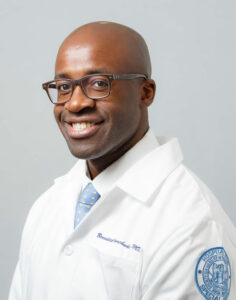Arthroscopic Frozen Shoulder Surgeon

Frozen shoulder commonly occurs in patients between the ages of 40 and 60 years of age and can be associated with underlying medical conditions, such as diabetes, thyroid disorders and cervical spine conditions. The goal of arthroscopic frozen shoulder surgery is to release and stretch the stiffened joint capsule during the frozen stage. Arthroscopic frozen shoulder surgeon, Doctor Benedict Nwachukwu provides diagnosis as well as surgical and nonsurgical treatment options for patients in Manhattan, New York City, NY who have developed frozen shoulder. Contact Dr. Nwachukwu’s team today!
What is frozen shoulder?
Frozen shoulder, also known as adhesive capsulitis, is a type of shoulder stiffness that causes pain, discomfort and limited movement. Frozen shoulder commonly occurs in patients between the ages of 40 and 60 years of age and can be associated with underlying medical conditions, such as diabetes, thyroid disorders and cervical spine conditions. Frozen shoulder occurs when the connective tissue and capsule surrounding the shoulder joint becomes inflamed and then tightens and thickens, shrinking the space in the capsule. The thickened and adhesive capsule limits shoulder motion in a diffuse fashion which can be very painful and debilitating. If a patient in Manhattan, New York City or the surrounding New York boroughs has a frozen shoulder that has not resolved over time, Dr. Benedict Nwachukwu, orthopedic shoulder surgeon, can offer a surgical procedure called arthroscopic frozen shoulder treatment to help patients obtain pain relief and regain the mobility of their shoulder.
What is an arthroscopic frozen shoulder treatment?
Tendons, ligaments and bones make up the shoulder joint and are encased in a capsule of soft tissue. Frozen shoulder is when the tissues within this capsule become inflamed and create adhesions and thickening. This thickened, inflamed tissue causes a “scar-like” build up which restricts movement and creates a loss of shoulder motion. Dr. Nwachukwu can do an arthroscopic frozen shoulder treatment to release the tight shoulder capsule. This procedure, also called a capsular release, is minimally invasive and can be done through small incisions in the shoulder. Dr. Nwachukwu uses a small camera and small instrument to perform this specialized surgery. Because the surgery is minimally invasive, it allows for a quicker healing time with less pain, a lower risk of infection and a lower risk for further complications.
What is manipulation under anesthesia?
Patients in the New York area with a frozen shoulder may wish to undergo a treatment called manipulation under anesthesia (MUA). During this specialized procedure, Dr. Nwachukwu carefully moves the shoulder through a specific range of motion, causing the inflamed scar-like adhesions to stretch within the shoulder capsule. This releases the tight capsule and increases the range of motion which in turn improves shoulder pain. The procedure does not involve an incision but moves the shoulder by manipulation while the patient is under anesthesia.
What is done during an arthroscopic capsular release?
Arthroscopic frozen shoulder treatment is typically offered during the frozen stage. The goal of the surgery is to release and stretch the stiffened joint capsule. During this specialized surgery, Dr. Nwachukwu inserts a radiofrequency (RF) probe into the shoulder which uses RF waves to cut the tissue capsule which surrounds the shoulder joint. This allows the joint to move more freely. The radiofrequency waves cauterize the tissues as they are cut, so there is minimal bleeding within the joint.
Dr. Nwachukwu may use both arthroscopic frozen shoulder capsular release and manipulation under anesthesia to achieve the best results for his patients in New York.
What happens after arthroscopic capsular release?
Patients are given pain medication to be taken as directed by Dr. Nwachukwu and can leave the hospital the same day. Immediate rehabilitation is necessary to prevent shoulder stiffness and the recurrence of frozen shoulder. Physical therapy and a specific post-operative protocol needs to be followed to achieve the best outcome and to restore full, pain-free range of motion. Typically, full range of motion can be achieved in 6 weeks following an arthroscopic frozen shoulder treatment.
For additional resources on arthroscopic frozen shoulder treatment including surgical and manual release, or to have your shoulder pain evaluated, please contact the office of Benedict Nwachukwu, MD, orthopedic shoulder surgeon serving Manhattan, New York City and surrounding New York boroughs.





